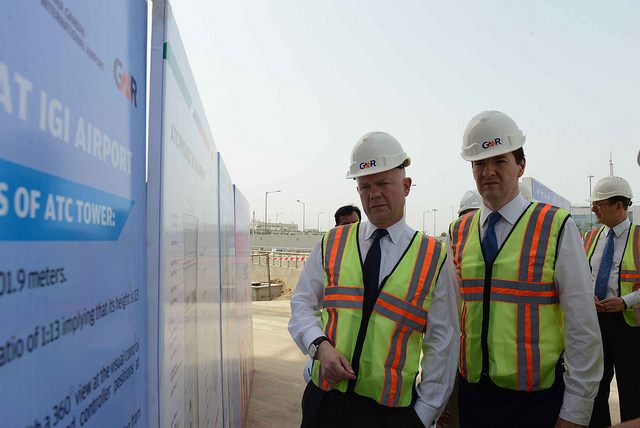The emerging political consensus around local growth is encouraging, but now the hard work really begins
Devolution to local and regional government has been in vogue recently, with George Osborne and Ed Miliband each voicing their preferences for a new settlement between central and local government. Here, Neil McInroy argues that that is all well and good, but warm words are only a start, and that think tanks, campaigners, businesses and civil society must make sure pressure is put on whoever is in power to make sure that these fine aspirations become a reality.

Can George Osborne build sub-national government? (Credit: British High Commission, CC BY NC ND 2.0)
A head of steam around powers for local government, local economic growth and solving regional economic divides is growing. But this is a beginning, and we must keep the pressure on.
In a pro-northern speech, the George Osborne sketched out a vision of a ‘northern powerhouse’. Furthermore, the long awaited local growth deals reveal the amount of Whitehall resource attached to the local growth plans produced by the 39 local enterprise partnerships (Leps). From the opposition, the local government innovation task force, set up by Ed Miliband, has launched its People Powered Public Servicesreport and last week the Adonis review detailed a muscled industrial and economic strategy with a series of reforms to business, procurement and skills.
It’s promising that national political parties are now in some agreement. It’s agreed that local economic growth is best served when it comes with some power over local resources. It’s agreed that some decisions about transport, skills etc are best made by town halls and combinations of local authorities, working with businesses and Leps rather than Whitehall departments. It’s agreed that you can address demand on public services by co-ordinating spending across local authorities and local agencies.
However, let’s not get too excited. We could be witnessing another false dawn. The truth of the matter is that we are trying to change a grossly over-centralised country and dislodge a settled economic geography which is unequal, unbalanced and increasingly divergent.
This recent momentum follows a long history of policy which has tried and ultimately struggled to deal with this ‘regional problem’ and an emasculated local government. We have seen policies come and go: the Barlow commission in 1940; the industrial policies of Labour’s Wilson government; regeneration of the 80s and onto the last government’s regionalism.
Whitehall has form. Past efforts have just kept local government in its servile place and at best has just slowed the pace of a growing economic gap. National legislators and civil servants often choke when it comes to actually giving power away to local areas. Whitehall is a master at smothering promise under the yoke of process and micro-managerialism.
So, we still have a long way to go. The problems of a possible financial meltdown in local government remain and there are no plans to increase the level of local fiscal autonomy via real tax raising powers. Everything has to be earned and bargained for, with Whitehall holding the aces in many of the deals. No one is offering a new constitutional settlement. Instead we have the prospect (albeit some variations in pace) of an incremental drip drip of power and resource towards one.
As yet absent from this momentum is any serious querying of the economic model. It would be a tragedy, if in achieving local power, we merely replicate a localised version of the national economic model which has failed to deliver on poverty and inequality.
Excellent work by Cresc at the University of Manchester, reflected in a recent article by Professor Karel Williams, critiques the orthodoxies and the economic basis to present policy. We need to appreciate that, at present, local economic plans remain shoehorned into an economic model which complies with the treasury version of the English economic state and the role of local economies in it.
Concepts such as agglomeration and significance of city size are viewed as supreme truths rather than economic choices within places that are laden with complex economic and social processes. High tech knowledge clusters and agglomeration are solid options – for some. But it’s not the only way. Our local economies are varied, starting from different places: some are thriving , some are ticking on, some are very far from economic success.
We must appreciate this variation, and let different economic visions and paths to economic success flourish. The future could be about local social and economic contracts driven by local decisionmakers, business and citizens, which closely reflect how the local economy works, what people want and local determined pathways to how local economies fit into globalisation. National economic policy, instead of tramlining approaches, needs to encourage a plurality of economic development pathways and allow many local economic flowers bloom.
This recent momentum is a start. However, now the hard work begins. Leps, local government, think tanks, business and civil society must keep the pressure on. We must work on achieving an incremental drip drip of power and resource, leading to a steady flow, freeing up local areas to choose their own social and economic path, free from the strictures of Whitehall. The push for local power is just beginning.
—
Note: this post represents the views of the author and not those of Democratic Audit or the LSE. Please read our comments policy before posting. The shortened URL for this post is: https://buff.ly/1oEl1t9
—
 Neil McInroy is the chief executive of the Centre for Local Economic Strategies (CLES)
Neil McInroy is the chief executive of the Centre for Local Economic Strategies (CLES)





 Democratic Audit's core funding is provided by the Joseph Rowntree Charitable Trust. Additional funding is provided by the London School of Economics.
Democratic Audit's core funding is provided by the Joseph Rowntree Charitable Trust. Additional funding is provided by the London School of Economics.
The emerging political consensus onlocal growth is encouraging, but now the hard work really begins says @nmcinroy https://t.co/xu88HuvY54
The emerging political consensus around local growth is encouraging, but now the hard work really begins https://t.co/9EzaDskHPo
Emerging political consensus around local growth is encouraging, but now the hard work really begins https://t.co/4mB8Jbc0UN @democraticaudit
The emerging political consensus around local growth is encouraging, but now the hard work really begins https://t.co/wA7sgoRqvA